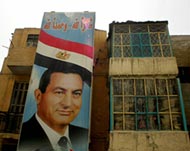Brotherhood leaders held in Egypt
Egyptian security forces arrested four leaders of the banned Muslim Brotherhood, two days after mass demonstrations swept main towns calling for reform, a movement source said.

“Issam al-Aryan was arrested and his house was searched Friday by police,” a spokesman of the Islamist group, Abd al-Moneim Mahmoud, said.
Al-Aryan is a leader of the movement, which has been banned since 1954 but still ranks as Egypt’s leading opposition force. The movement has stepped up its demands for reforms ahead of presidential and legislative polls.
Al-Aryan is also the official spokesman of the movement’s supreme guide, Mohammed Mehdi Akef.
‘Banned demonstrations’
Police also arrested Omar Darrag, president of Cairo University’s lecturers’ club, teacher Hamdi Shahin and Yasser Abdoh, all of whom are brotherhood leaders, said Mahmud.
 |
|
Mubarak has agreed to amend |
The detained men stand accused of “preparing to hold banned demonstrations,” he said, adding that police had been told about demonstrations to be held at several mosques in the capital on Friday to show support for Palestinians.
Police reported 400 arrests in the past few days across the country with 350 Muslim Brotherhood members placed in preventive detention for 15 days for having violated a ban on street protests and for allegedly wounding several officers and soldiers.
The organisation said as many as 1546 of its followers had been arrested during and after its wave of pro-reform demonstrations on Wednesday, but without giving details on the number of those placed in preventive detention.
Reform?
Under growing domestic and international pressure, 77-year-old President Hosni Mubarak agreed last February to amend the constitution to allow multi-candidate elections for the first time in Egypt’s history.
The amendment is to be discussed in parliament on Tuesday, but Mubarak has yet to announce whether he will run for a fifth six-year term in presidential elections in September.
Under the proposed changes, a candidate would need the support of 10% of lawmakers and other members of regional and local councils, all bodies which are dominated by Mubarak’s National Democratic Party (NDP).
“The Muslim Brotherhood is using foreign pressure on the Egyptian regime to improve its own political and legal standing,” said political analyst Nabil Abd al-Fattah.
“They want real representation in parliament that would reflect their political weight in Egypt’s political arena.”
Real change
Abd al-Fattah estimated the group could clinch 30 to 35% of parliament’s 453 seats in free and fair elections.
The next parliamentary polls are due in November.
“No to cosmetic reforms, yes to real reforms,” was the rallying cry on Wednesday from thousands of marchers who heeded the movement’s call for protests in eight provinces across Egypt.
|
“The Muslim Brotherhood is using foreign pressure on the Egyptian regime to improve its own political and legal standing” Nabil Abd al-Fattah, |
They also denounced the state-owned media as corrupt and chanted slogans calling for the abrogation of emergency laws that have been in place since the 1981 assassination of president Anwar Sadat.
“We want to build a large national front for reforms and against corruption,” Muslim Brotherhood chief Akef said in a statement Thursday.
“We shall continue to fulfil our legitimate and national duty. We will not give up our demands for rights for our people, in peaceful and civilised ways,” he added.
Police violence
The movement said police violence led to “the serious injuries of hundreds who were denied access to hospitals”, while some of those rounded up by police were “deprived of food and medicine” and “mistreated and physically harmed”.
Wednesday’s mass demonstrations came exactly a week after the Kifaya (Enough) opposition group held rallies in 13 cities under the banner of “No Constitution without Freedom”.
Its marchers also clashed with club-wielding police but the 75 people were later released.